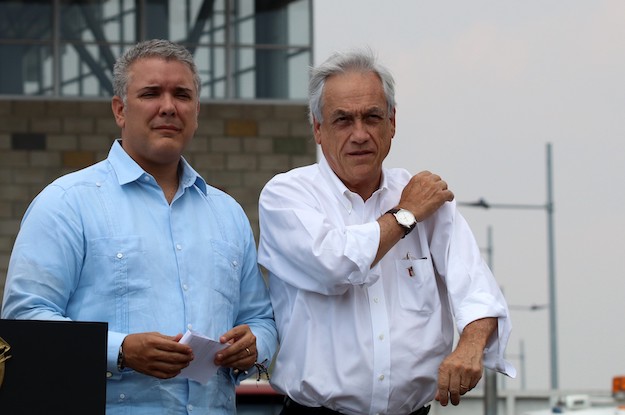In early March, Colombia’s President Iván Duque and Chile’s President Sebastián Piñera will hold court in Santiago to launch what they hope will be an important new force in South American politics.
Duque and Piñera say their proposal, Prosur, will serve as a pragmatic replacement to the nearly extinct UNASUR (which recently lost Colombia and Chile as members), promoting economic integration and political coordination in the region without the latter’s bureaucratic and ideological excesses. Every country on the continent will be free to join, with the exception of Venezuela.
But does South America need a new regional body? As attractive as the idea might sound, Prosur is very likely to fall into the same irrelevance and suffer from the same lack of purpose that has plagued so many other attempts to strengthen integration in Latin America. There are several reasons why.
The first is that, despite Piñera’s and Duque’s intentions, Prosur won’t have the legitimacy to survive when incumbent leaders leave office. Given the two presidents’ politics, the new group will be seen as a pro-market and right-wing institution, just like UNASUR was perceived as a platform for the leftist policies of former presidents Luiz Inácio Lula da Silva of Brazil, Hugo Chávez of Venezuela and Cristina Fernández de Kirchner of Argentina.
As a result, left-wing governments in Uruguay and Bolivia will probably not join Prosur at all, while other countries will question their involvement when leaders from the left return to power. In fact, given the (understandable) exclusion of Venezuela, Prosur will already have less legitimacy than its predecessor: In 2008, the founding treaty of UNASUR was signed by all South American countries, including Colombia under then-President Álvaro Uribe.
Second, Prosur will lack leadership, since Duque and Piñera are moving ahead with the project without the explicit support of Brazilian President Jair Bolsonaro. The very concept of South America (as opposed to a wider Latin America) is a Brazilian idea and was designed to project Brasília’s influence over its immediate vicinity without interference from Mexico or the United States. The original idea behind UNASUR, in fact, was developed by Lula’s predecessor as president, Fernando Henrique Cardoso. Brazil contains half the geography, population and gross domestic product of South America. Creating a South American initiative without Brasília’s backing is wishful thinking.
Third, Prosur’s mission and goals are surrounded by a level of vagueness that is excessive even under the low standards of Latin American regionalism. The Chilean and Colombian governments have promised a mechanism to facilitate economic and physical integration, inspired by the Pacific Alliance bloc they form with Mexico and Peru. That is unlikely to work, since the Alliance binds together countries that have similar outward-oriented and pro-market policies that are not shared across South America. Mercosur members Argentina and Brazil, for instance, are unlikely to open their economies, despite the liberalization agendas of their governments.
But the founding fathers of Prosur also want it to become a political forum to discuss issues such as the Venezuelan crisis. In fact, Duque said that one of the goals of Prosur should be to end the dictatorship in that country. Given ongoing and profound differences among South American countries regarding Venezuela, this is hardly a call for unity. Once again, Brazil would not allow its strategy vis-à-vis Venezuela to be decided outside its borders. Further, increased U.S. involvement has heightened tensions within the Lima Group, a loose gathering of like-minded Latin American countries created to pressure Venezuela’s Nicolás Maduro. It is unlikely that Prosur would fare much better in such a difficult environment.
In the past few decades, many initiatives to promote integration among Latin American and South American countries have been unsuccessful, for a number of reasons: lack of leadership from the region’s larger countries, governments’ refusal to cede sovereignty to international bodies, political differences among member countries, and a lack of economic complementarity. At the present, all of these conditions remain, and have become even more acute. Prosur is therefore likely doomed to become another empty shell in the museum of Latin America’s failed regional institutions.
—
Binetti is a non-resident fellow at the Inter-American Dialogue and visiting professor at Torcuato Di Tella University, based in Buenos Aires








